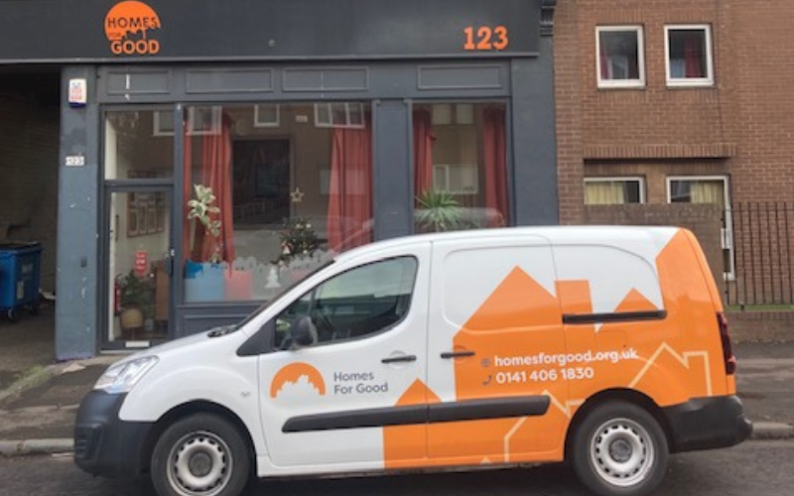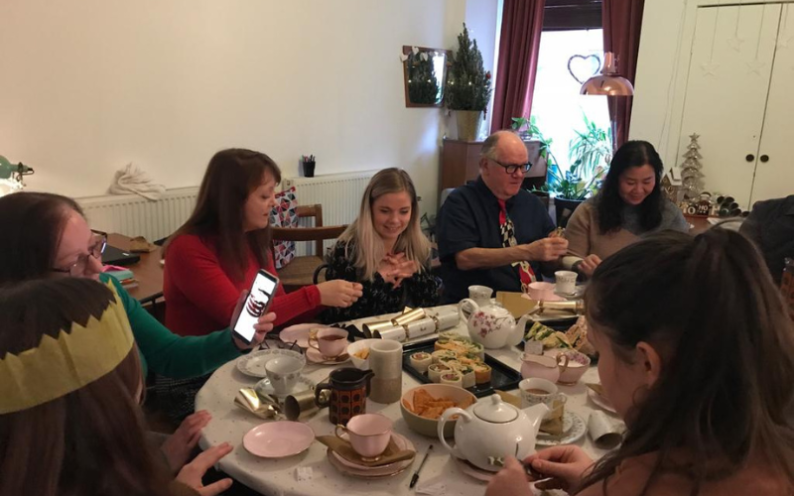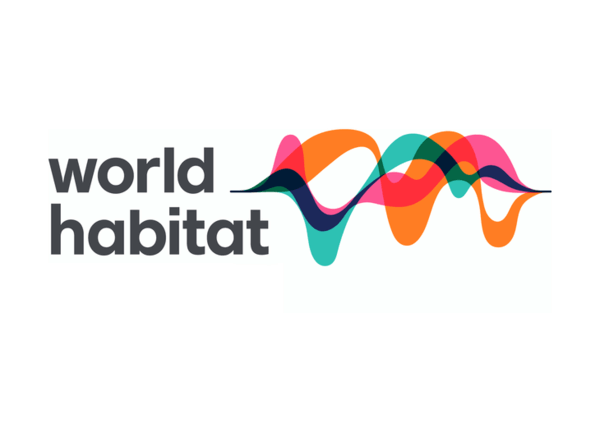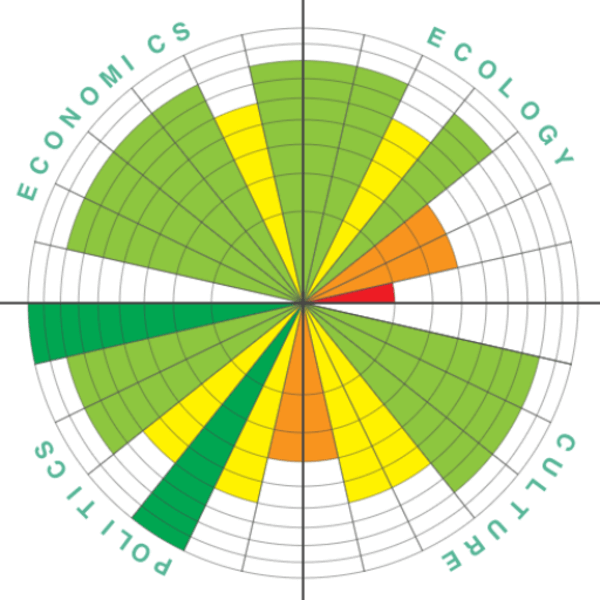 Homes For Good - © World Habitat Awards
Homes For Good - © World Habitat Awards Homes for Good - © World Habitat Awards
Homes for Good - © World Habitat Awards
City
Glasgow
Main actors
Supranational / Intergovernmental Institutions, Private Sector, NGO / Philanthropy
Project area
Whole City/Administrative Region
Duration
Ongoing since 2013
World Habitat Awards
This project was awarded the 'World Habitat Awards' in 2023 in the following category: Gold.
State investment in new social homes has been decreasing in the UK since the late 1970s. Existing social housing stock was further depleted by the right-to-buy policy introduced in the 1980s, which allowed tenants to buy their homes at greatly subsidised prices.
The lack of social homes means low-income households are increasingly seeking accommodation in the private rented sector. However, the cost of private housing has increased dramatically, leaving many people unable to access an affordable good-quality home.
Homes for Good was established in 2013 following the founder’s first-hand negative experience as a landlord within the private rented sector which prompted her to develop a different kind of agency that works for landlords and tenants. Following a mystery shopping exercise, Homes for Good found that just 3% of the approximately 500 two-bedroom properties on the market in 2013 were both affordable and accessible to people on benefits and those that were available were in extremely poor condition.
Homes for Good is a group of four companies, each with its own part to play in delivering the enterprise’s core objectives, from purchasing and renovating homes to property management, tenancy support and property maintenance.
The organisation also works with a number of partners to help it achieve its aims. The housing and homelessness charity Shelter helps Homes For Good identify properties that are long-term empty, which it invests in through its acquisition programme.
Homes are renovated to a high standard before being let to tenants in need – including those on benefits or low incomes or at immediate risk of homelessness – with rent based around the local housing benefit rates to ensure affordability.
Tenants are found in two ways: by advertising properties on the open market through online real estate portal Rightmove, and via referrals from partnership organisations, including homelessness and social support charities.
Homes For Good also leases 125 homes to partner organisations supporting people with more complex needs. These include:
- TARA, which works with women rescued from trafficking
- RightThere, which provides emergency temporary accommodation to homeless people
- MEARS, which supports asylum seekers while their claims to stay in the UK are being processed
These organisations provide ongoing intensive support to tenants, which is further supplemented by Home For Good’s unique general tenancy support approach. This focuses on building a relationship with each individual to help them to feel happy and settled in their home and supporting them to flourish in other parts of their lives.
This specialist approach includes the organisation’s Love Home programme, which partners interior designers with tenants to help them create homes they want to live in. They do this through personalising and decorating, ranging from full room makeovers to simply adding a few accessories, and through creative activities such as making artwork.
Homes For Good supports tenants in managing their finances with energy advice support from The Wise Group (a social enterprise working to lift people out of poverty) – offering advice on fuel debt and minimising energy bills. Meanwhile, the Govan Law Centre provides specialist legal support to Homes For Good tenants who are struggling with rent arrears due to delays in benefits claims and works with them to maximise their income.
The organisation also prioritises creating work opportunities for people who are unemployed or at risk of redundancy. Since 2019, it has created six jobs within its in-house repairs and maintenance company.
After a few years of pitching the concept to partners, investors and local authorities, and after raising investment from mainstream lenders as well as social investors, Homes For Good managed to secure its first £1 million ($1.25 million USD) in August 2014, with which it bought 17 properties.
Today, Home For Good’s capital costs – the purchase, renovation, and furnishing of properties – are fully funded through investment in the form of equity (Big Issue Invest owns 20% of Homes for Good Investments), and debt financing, with lenders Charity Bank, Big Society Capital and Social and Sustainable Capital.
Ongoing operating costs, including property management, repairs, insurance, and interest and capital repayments to investors, are covered through rental income. Additional future costs are monitored through a robust asset management plan which is reviewed every two months. Homes For Good has also developed an operational improvement plan to ensure its properties continue to be quality homes for their tenants. This covers communal repair issues and other capital expenditure such as upgrading kitchens, windows, or energy efficiency measures.
Homes For Good funds its tenancy support work, including Love Home, through grant funding from the National Lottery and its own resources. It is planning to develop an endowment fund, accessing investment from trusts and foundations, to ensure a sustainable income stream for this support work.
Homes For Good plans to raise a further £20 million ($25 million USD) to grow its housing portfolio to 500 owned homes across Glasgow and the west of Scotland by 2025, through medium to long-term lending arrangements.
Social impact
Homes For Good financially benefits tenants by giving them a secure and high-quality home they can afford. In Glasgow, the average rent for a one-bedroom property is £739 ($926 USD) per month. Home For Good’s average rent in the city is currently £480 ($600 USD) per month, which is 85% of the average local housing allowance rate across the portfolio.
More than 1,000 people have lived in HFG homes to date, and 90% of tenants earn less than the living wage or receive benefits. The average tenancy length is 27 months and rent arrears are less than 2%, demonstrating the affordability for tenants.
The organisation’s flexible engagement with tenants varies from three monthly check-in visits to daily contact and provides advocacy for tenants with time critical and intensive support needs. This engagement has a wider focus than housing alone, and includes a programme of activities to improve wellbeing, reduce isolation, and offer opportunities to develop new skills.
Since 2020, tenants have been consulted on a regular basis about issues that affect their lives, such as benefit changes, through an informal tenant’s advisory forum. This forum was used to inform a response to the government’s proposed New Deal for Tenants legislation, ensuring their voices and experiences were heard. A Homes For Good Tenant Community Group on Facebook was created during the Covid-19 lockdown and provides another way for tenants to engage with each other.
Environmental impact
Bringing empty homes back into use and refurbishing dilapidated properties improves the local environments in which Homes For Good is active and reduces the need to build new homes.
The organisation is developing a net-zero strategy and is currently researching the best way to assess its carbon footprint. It is also developing an action plan to minimise its carbon emissions. Measures to be taken include using recycled furniture and household goods and the creation of a Love Home Emporium as a freecycling hub, in addition to minimising waste within its renovation programme.
A time-scaled asset management plan will incorporate physical improvements to Home For Good’s properties to ensure their Energy Performance Certificate ratings are the highest they can be and comply with incoming legislation.
Low-income tenants particularly struggle with affordability, insecurity of tenure and poor property conditions in the private rented sector. In addition to this, over 75% of private landlords will not rent to people receiving any kind of state benefits, which further restricts access.
Homes For Good is active in disseminating its work and has supported other organisations across the UK to adopt similar approaches, leading to a growing social investment movement in affordable housing across the country. It has also influenced policy and practices, and directly informed the development of the £50 million ($62.5 million USD) Social and Sustainable Housing fund, and the £26 million ($32.5 million USD) Women in Safe Homes fund.
Homes For Good is leading by example and proving it is possible to operate profitably by letting good-quality homes at affordable rents to people on low incomes. Its presence is not only driving up standards in the private rented sector but also improving the health and wellbeing of tenants, who can use the stability and support provided by a Homes For Good home as a springboard for success in other areas of their lives.
Grant funding from the National Lottery to replicate the Homes For Good letting agency model in other parts of the UK has been received. This funding will support the operating costs of a letting agency start-up in its initial years and create the opportunity to explore expanding a property investment programme.
External links / documents
On Map
The Map will be displayed after accepting cookie policy

